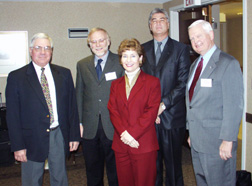 |
Nebraska state senators Roger Wehrbein of Plattsmouth, left, and Jim Jensen of Omaha, right, visited with researchers Max Wicha, M.D. (second from left), Mary Hendrix, Ph.D., and Joe G.N. Garcia, M.D., during their visit to UNMC on Nov. 27. |
Three top scientists were at UNMC last week to review how the university has used the research money received from the state’s tobacco settlement.
The three compose the advisory council for the UNMC Tobacco Settlement Biomedical Research Development Fund. They include Joe G.N. Garcia, M.D., an expert in pulmonary and vascular function and disease; Mary Hendrix, Ph.D., a biomedical research expert in the metastasis of cancer; and Max Wicha, M.D., a nationally recognized researcher of breast cancer.
“These outstanding scientists offered valuable perspective regarding the UNMC research strategic plan,” said Thomas Rosenquist, Ph.D., vice chancellor for research at UNMC. “At the same time, they were impressed with many of our existing research strengths.”
In 2001, the Nebraska Legislature approved a bill that allocated $10 million annually to the state’s four biomedical research institutions. UNMC has received about $4.9 million in each of the past two years. With that money, the university has recruited nationally recognized researchers in ophthalmology, metabolic disease, urology and cancer, among others.
As part of the legislation, advisory groups must be formed for each of the four campuses. This was the first meeting of any of the advisory groups.
The following are short biosketches of each of the three members on the advisory group.
Joe G. N. Garcia, M.D.
Dr. Garcia is director of the Division of Pulmonary and Critical Care Medicine in the Department of Medicine and director of the Occupational Lung Center at Johns Hopkins Bayview Medical Center. Dr. Garcia is an expert in pulmonary and vascular function and disease and is the author of nearly 150 scientific articles. He has served on numerous editorial boards, including as associate editor of the American Journal of Respiratory Cell & Molecular Biology and Endothelium, and he has served in a number of important leadership roles with the National Institutes of Health and with respiratory societies. He joined the Johns Hopkins faculty in 1998.
Mary J. C. Hendrix, Ph.D.
Dr. Hendrix joined the faculty of The University of Iowa in June 1996 as the Leading Woman Scientist Endowment Recipient and head of the Department of Anatomy and Cell Biology. She also serves as the Kate Daum Research Professor and Associate Director of Basic Research and Deputy Director for The Holden Comprehensive Cancer Center at The University of Iowa, as well as the Chair of the Research Advisory Committee for the Roy J. and Lucille A. Carver College of Medicine. She has served on several editorial boards and is the past-president of FASEB (Federation of American Societies for Experimental Biology) consisting of over 65,000 members, the largest coalition of biomedical research associations in the United States. Dr. Hendrix has over 150 publications in biomedical research. Her scientific objectives include identifying genes that contribute to cancer metastasis and other related diseases, which exhibit similar biological activities.
Max S. Wicha, M.D.
Dr. Wicha is the founding director of the University of Michigan Comprehensive Cancer Center and is the Distinguished Professor of Oncology and Professor of Internal Medicine at the University of Michigan Medical School. Dr. Wicha is nationally known for his research in the field of breast oncology, particularly the study of how breast cancer cells grow and metastasize. He has authored numerous book chapters and peer-reviewed scientific articles, served as a reviewer for several prominent scholarly publications, and made additional contributions as a member of the boards overseeing many national cancer organizations. Dr. Wicha also has served as chair of the National Cancer Institute’s Cancer Center Support Review Committee and as president of the American Association of Cancer Institutes. He is a founding member of the National Comprehensive Cancer Network.